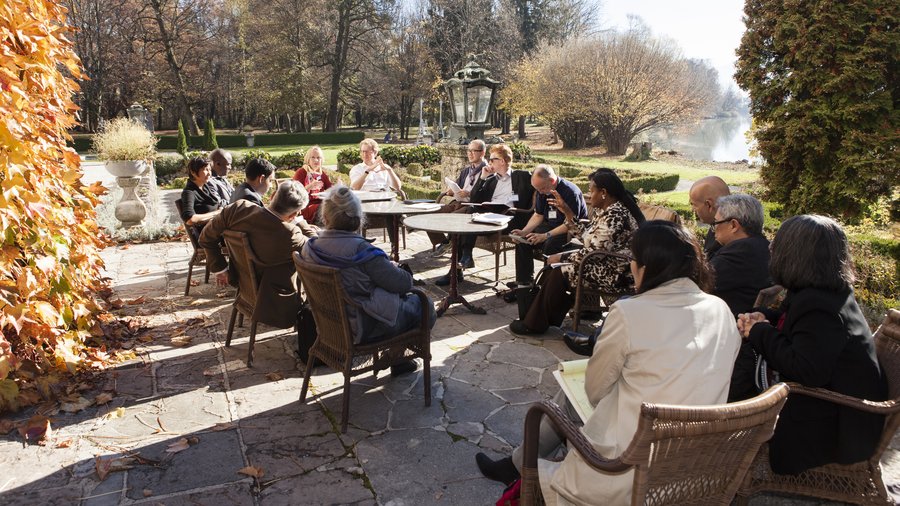The third day tackled the role of older people in the workplace
The world of work has changed drastically in the past few decades. But what will the future look like – and where will older people fit in?
This was the issue at hand for the panel “The Future of Work and Markets: Technology and Innovations to meet 21st Century Social Needs” on the third day of the Salzburg Global Seminar program on Aging Societies: Advancing Innovation and Equity.
Gone are days of going to the factory or the mine, and even going to the office on a daily basis is starting to wane as more people work from home, for themselves, or in the more informal “Uber” economy.
Far from further excluding the older generation from the workplace, these changes could potentially (re-)include them into the workforce.
A greater number of older people are healthy enough to work – and willing to continue working. Although “fluid intelligence” (e.g. cognitive function, speed, and flexibility) declines as we age, “crystalline intelligence” (such as knowledge and experience) increases. Thus, older workers may be less productive than younger workers (if productivity can truly be measured), but their experience should still prove valuable.
Greater flexibility of working hours and location should better allow for workers’ changing levels of productivity, allowing them a “soft landing” rather than retiring from work entirely.
This greater flexibility should also be offered in terms of tasks; routine has been found to be a key reason for falling productivity. Rotation schemes within companies may help maintain versatility.
More lifelong learning or “upskilling” should be encouraged, either in the workplace (enabling companies to retain skilled workers for longer) and outside, enabling workers to shift careers if needed. As businesses are unlikely to support workers in acquiring non-task-related skills, for which they will see little-to-no return-on-investment, considerations need to be made regarding who will pay for this training – individuals or governments?
This shift in careers is also likely to become a greater trend as “jobs for life” become much more scarce. The “portfolio of careers” will become the norm, and “wisdom workers” should be highly valued. More mentoring schemes and the introduction of “Chief Elder Officers” into businesses, especially start ups, could help greater intergenerational knowledge exchange.
For those workers who wish to stay in their workplace, rather than work from home or for themselves, these workplaces should become more “age-friendly,” some participants suggested. However, such suggestions were met with the counter-argument: by making our workplaces more comfortable and easily accessible, we have also developed a more sedentary workforce – making workers less healthy and thus more likely to retire early through ill-health. The unintended consequences need to be more carefully considered!
Sharing ideas at the knowledge cafe
In addition to the panel-led discussions, country/region-focused team work and thematic dialogue groups, participants in Salzburg also took part in a “knowledge cafe,” with six Fellows leading discussions on a variety of topics and participants cycling around several tables.
Samir Sinha, director of geriatrics at Mount Sinai and the University of Health Network Hospitals in Toronto, Canada led conversations on how to move “From Ideas to Strategies for Action.”
At another table, UK-based international policy advisor Ann James addressed “Aging Societies: Applying Human Technology Approach to Critical Issues.”
Idea exchanges around “Generational Gaps and Conflicts” were led by Moon Choi, assistant professor of aging and technology in the Graduate School of Science and Technology Policy at the Korea Advanced Institute of Science and Technology (KAIST).
Associate professor at Nanjing University’s School of Business, Maoliang Bu asked his table of Fellows: “How can the silver industry potential be better used for China?’
Stanislawa Golinowska, professor at Jagiellonian University in Krakow, Poland held a table discussion on “Health Promotion and Prevention of Risk-Actions for Seniors.”
The Salzburg Global session Aging Societies: Advancing Innovation and Equity is part of the multi-year seriesDesigning a Social Compact for the 21st Century. The session is being hosted in partnership with Wirtschaftskammer Österreich and is sponsored by TIAA-CREF Financial Services and Tsao Foundation. More information on the session can be found here: www.salzburgglobal.org/go/540. For more information on Designing a Social Compact for the 21st Century, please visit: socialcompact.salzburgglobal.org


